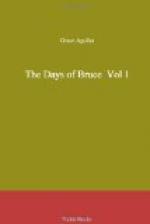The deadly pallor which had usurped the flush of fury on the monarch’s cheek afforded such strong evidence of a sharp renewal of his internal pains, that both noblemen hesitated to obey. The damp of agony stood upon his forehead a moment in large drops, then absolutely poured down his cheeks, while his gaunt frame shook with the effort to suppress the groan which his throes wrung from him. Seizing a cordial near him, Buchan presented it on his knee, but Edward only waved them both away, angrily and impatiently pointing to the door. He loved not the weakness of an appalling disease to be witnessed by his courtiers. When utterly incapacitated from either the appearance or functions of the sovereign, he chose to be alone, his pride scarcely brooking even the cares of his young and beautiful wife, or the yet wiser and truer affection of his daughters. The effects of this interview will be seen in a future chapter.
CHAPTER XXIII.
There was an expression of both sorrow and care on the fine and winning features of the Princess Joan, Countess of Gloucester, as she sat busied in embroidery in an apartment of Carlisle Castle, often pausing to rest her head upon her hand, and glance out of the broad casement near which she sat, not in admiration of the placid scene which stretched beyond, but in the mere forgetfulness of uneasy thought. Long the favorite daughter of King Edward, perchance because her character more resembled that of her mother, Queen Eleanor, than did either of her sisters, she had till lately possessed unbounded influence over him. Not only his affection but his pride was gratified in her, for he saw much of his own wisdom, penetration, and high sense of honor reflected upon her, far more forcibly than in his weak and yielding son. But lately, the change which had so painfully darkened the character and actions of her father had extended even to her. Her affection for a long time blinded her to this painful truth, but by slow degrees it became too evident to be mistaken, and she had wept many bitter tears, less perhaps for herself than for her father, whom she had almost idolized. His knightly qualities, his wisdom, the good he had done his country, all were treasured up by her and rejoiced




